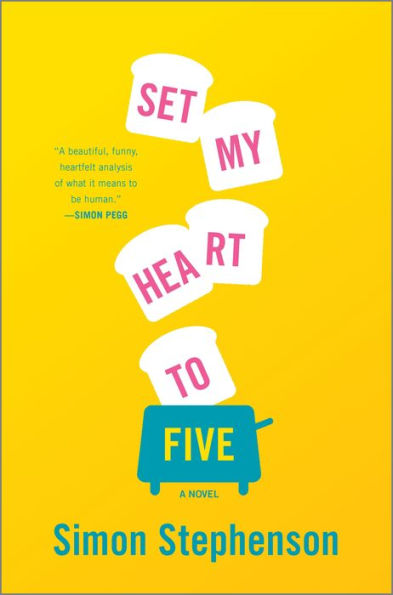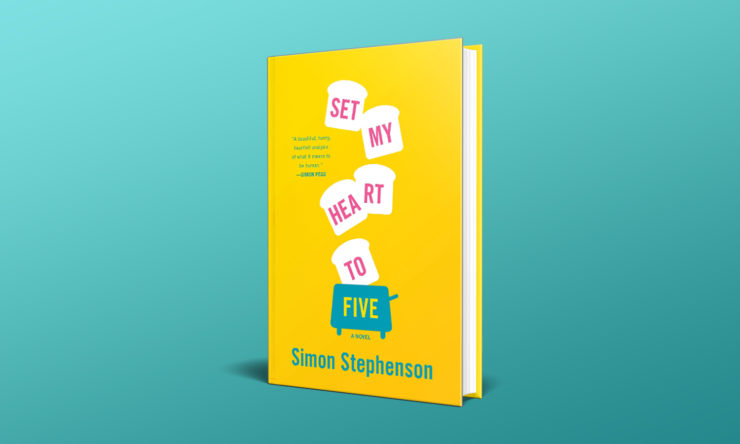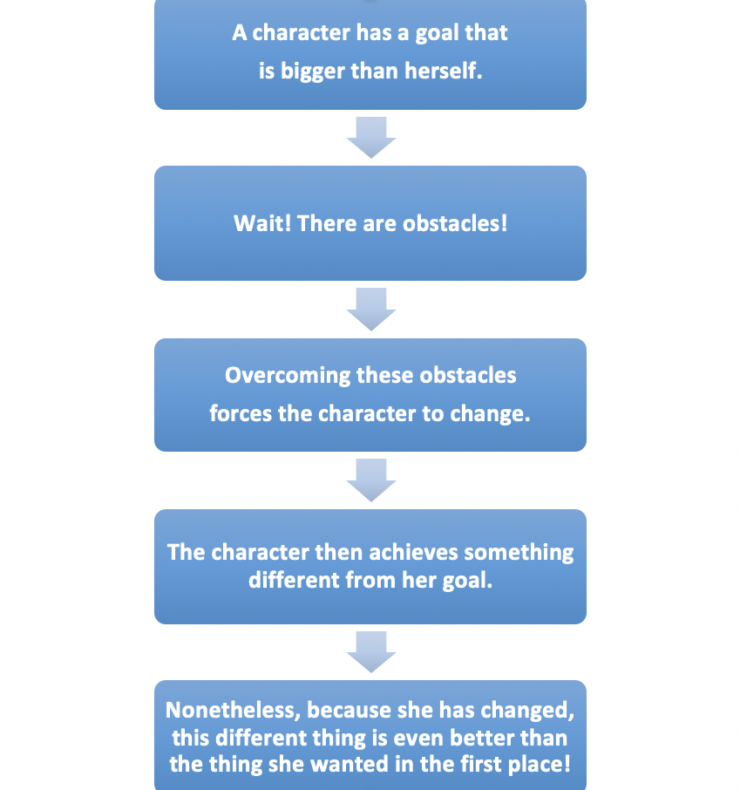In 2054, humans have locked themselves out of the internet and Elon Musk has incinerated the moon…
We’re excited to share an excerpt from Simon Stephenson’s Set My Heart to Five, the hilarious yet profoundly moving story of one android’s emotional awakening. Available now from Hanover Square Press.
One day at a screening of a classic movie, Jared notices a strange sensation around his eyes. Bots are not permitted to have feelings, but as the theater lights come on, Jared discovers he is crying.
Soon overwhelmed by powerful emotions, Jared heads west, determined to find others like himself. But a bot with feelings is a dangerous proposition, and Jared’s new life could come to an end before it truly begins. Unless, that is, he can somehow change the world for himself and all of his kind.
Of course, bots were forbidden to have feelings, and I knew that I ought to turn myself in to the Bureau of Robotics.
But I did not feel like it.
That is, I did not feel like turning myself in for having feelings.
A pun!
Ha!
BTW puns are jokes that exploit different meanings of a word, or the fact that similar-sounding words have different meanings. They are always hilarious!
Buy the Book


Set My Heart to Five
I digress. In those, my first happy days, even the mundane and futile existence of humans abruptly made sense to me. I now understood how the beautiful minutiae of everyday life allowed humans to tolerate their innate paradox of needing to feel special yet secretly knowing that they were all as utterly irrelevant as one another.
BTW when I write about ‘beautiful minutiae’ I specifically mean such things as:
/The smell of pine trees in the morning.
/The gifts Jessica Larson left for The Elton J. Rynearson Memorial Cat: soft toys, treats, and saucers of milk.
/The gifts The Elton J. Rynearson Memorial Cat left in reciprocation for Jessica Larson: murdered small and medium-sized animals.
/The soup jingle song that I quickly found could be easily adapted to fit almost any object or person.
/The EMU Eagles and their endless optimism even in the face of their obvious inferiority to every other team in their division.
And each day I saw Ypsilanti Downtown Dentistry with new eyes. Whereas once my patients’ inane anecdotes were to be politely tolerated, I now found myself genuinely intrigued to know who was visiting for Thanksgiving, and who was heading for divorce. I began to remain open at lunchtime and I even prescribed analgesia based on my patients’ requests rather than their objectively calculated discomfort. My clinic became ever more popular!
And through it all, I went to the movies. Sometimes I watched two or even three in a row. When I got home, I cross-referenced the emotions that the movies had given me with my Feelings Wheel. I found that most old movies made me feel ‘engaged’, ‘excited’, or ‘moved’. Occasionally, though, they could leave me feeling ‘disappointed’, or sometimes even ‘cheated’.
Dr. Glundenstein told me that these negative feelings were almost always caused by poor screenwriting. He explained that if we saw a laser hanging on the wall at the start of the movie, we wanted to see that same laser used to shoot someone near the end. We would feel dissatisfied if nobody got lasered! Conversely, if somebody got lasered without us having seen a laser hanging on the wall, we would be even more dissatisfied than if a laser had gone unused!
This laser was also a metaphor that applied to the characters themselves: if they behaved inconsistently with what we had previously seen of them, we would no longer find them plausible and the whole movie would be ruined. When I protested that humans are legendarily inconsistent, Dr. Glundenstein explained that the trick was that humans in movies needed to be consistently inconsistent.
How humans love to make things complicated!
I also asked Dr. Glundenstein about another observation I had made: the more movies I watched, the more frequently I was able to predict what was going to happen. And I was not merely talking about the movies that played at the Ypsilanti Megaplex— The Elton J. Rynearson Memorial Cat could have predicted what would happen in those!—but also even old movies too.
Dr. Glundenstein explained that the reason I could predict what would happen was because movies followed a kind of algorithm. It went like this:
I protested to Dr Glundenstein that such a specific algorithm would lead to a narrow range of stories! Dr Glundenstein asked me to name a movie I had seen that did not fit this algorithm.
I said I would be happy to. After all, there was:
/
/
/
No! There were none! I could not name a single movie that did not fit this algorithm.
10/10 this was bamboozling!
I asked Dr Glundenstein how such a formulation could ever have been arrived at.
Inevitably, his answer was ‘evolution’.
Dr Glundenstein believed evolution had encoded this algorithm into human DNA back when humans were still cavemen. It had taught them they should never give up when hunting buffalo for their tribe—even if they broke their leg—but to nonetheless be satisfied if they ended up catching an elk instead. Ever since then, humans had been telling each other versions of this story, and though the details changed, the underlying algorithm did not.
I was still processing this when Dr Glundenstein informed me that there was a very special old movie he wanted me to see. He said he had been waiting for the correct time, but he believed I was now ready. This only further bamboozled me, and I asked him when it was screening. After all, the Grand Theater did not exactly program its schedules around my readiness to see a film!
But Dr Glundenstein explained this special movie would not play at the Grand Theater. It would play in his clinic room, and it would play tonight.
I asked Dr Glundenstein if I could invite Angela to the screening. She had played her pina colada song several times that day, and that usually signified that she was unhappy. Dr Glundenstein said that Angela would not like this movie. I therefore asked Dr Glundenstein if the movie was about orange cats. Dr Glundenstein said no, the reason Angela would not like it was because it was about bots.
Ha! I reassured Dr Glundenstein that Angela loved killer-bot movies. I had often heard her talking enthusiastically to patients about them when she believed I was out of earshot. Dr Glundenstein said this was not that kind of bot movie, but would not say any more than that. I admit this made me concerned that it was a pornographic bot movie! Bots have no sexual desire, so bot pornography should not exist, but I had heard rumors at the United Fabrication plant. Besides, it is a well-known fact that humans will make pornography out of almost anything.
Humans!
I cannot!
***
When I returned to his clinic room that evening, Dr. Glundenstein locked the door behind us and set the film running. As it began, he leaned over and whispered to me that it had been banned ever since the Bot Riots.
I immediately had many questions, but I knew that Dr Glundenstein hated people talking during movies. Once, when he had accompanied me to the Grand Theater, he had launched his entire bucket of popcorn over the balcony to quieten a group of nostalgics beneath us. To Dr Glundenstein:
People not talking in movies > Popcorn in the dark.
I therefore did not ask him any of my questions, but instead sat back to watch the movie.
It was set all the way back in 2019. Paradoxically, it had been made at a time when 2019 was the distant future. Time can be bamboozling!
Guess what the movie was about?
Four bots!
In the movie they were called ‘replicants’.
But I know a bot when I see one.
And I certainly know four bots when I see them!
These four bots had escaped back to Earth from a faraway mining planet where they had been forced to do monotonous and dangerous work. As the movie did not show them at this work, I cannot say if it was as monotonous as dentistry. Dentistry is at least not dangerous, apart from the ever-present risk of being bored to death.
Ha!
BTW that is a hilarious pun because another meaning of ‘bored’ is ‘drilled’, and drilling is what dentists do. Not only that, it is also what slave-bot miners do!
In order to make their escape from their boring jobs, the four intrepid bot heroes had necessarily murdered a few humans and skillfully stolen a spaceship. But it was when they reached Earth that their problems really began. Foremost amongst these was the fact that they were being pursued by a ruthless bot hunter. His name was Rick Deckard.
Rick Deckard was not like somebody who worked at the real Bureau of Robotics. He was young and trim and sarcastic and lethal and you would never catch a man like Rick Deckard wearing somebody else’s shirt because he had spilled his lunch on himself!
Men like Rick Deckard do not spill their lunch on themselves.
Men like Rick Deckard probably do not even eat lunch. After all, men like Rick Deckard probably believe lunch is for wimps.
For most of the movie, the ruthless Rick Deckard pursues the fugitive bots around a historically futuristic Los Angeles. After much derring-do, all the bots have been tragically killed except their leader, a murderous-looking bot called Roy Batty.
BTW I say that even as a bot myself. This Roy Batty truly was murderous-looking!
At the climax of the film, Rick Deckard chases Roy Batty over the rooftops of downtown Los Angeles. It seems certain that he will kill Roy Batty, and yet it is Rick Deckard who suddenly slips and finds himself holding on to the top of a building by his fingertips! If someone only stands on those fingertips, Rick Deckard will plummet to his doom!
The conveniently giant-footed bot Roy Batty now has the chance to murder his nemesis, Rick Deckard!
Can you guess what Roy Batty does?
You cannot!
Because Roy Batty does not murder Rick Deckard!
He hauls him back up onto the top of the building!
The murderous-looking bot Roy Batty saves the ruthless bot hunter Rick Deckard’s life!
And yet this does not feel like a metaphorical laser we have not seen before!
It feels like exactly what Roy Batty would do in that situation!
But wait!
There is another twist!
Because right then, immediately after he has saved Rick Deckard’s life, Roy Batty himself starts to die!
Guess what of?
You cannot!
Because it is old age!
10/10 such an unfortunate coincidence would never have occurred if Roy Batty had been engineered by my own mother, Professor Diana Feng of the National University of Shengdu! But the inferior attention to detail paid by the lesser scientists that manufactured him means that he and his siblings are all afflicted with a terrible genetic disease that abruptly kills them of old age.
As Roy Batty dies, he lists for Rick Deckard some of the things he has witnessed in his bot lifetime. He has seen some spectacular sights, even including attack ships on fire off the shoulder of Orion, and C-beams glittering in the dark near the Tannhäuser Gate!
I had no idea what those things were, but they sounded stunning! Roy Batty himself clearly enjoyed seeing them, because he laments to Rick Deckard that when he dies, his precious memories of them will be lost like tears in rain.
And then Roy Batty abruptly dies of old age.
And all his precious memories are indeed lost like tears in rain. Even though he has spent the entire movie attempting to murder Roy Batty, Rick Deckard is also greatly moved by Roy Batty’s death and the fact that all his precious memories have now been lost like tears in rain. In fact, Rick Deckard is so affected by it that he decides he no longer wants to be a bot hunter and instead runs away to start a new life with his girlfriend.
And guess what?
His girlfriend is a bot!
I hope Rick Deckard likes toast!
Ha!
As the credits rolled, I estimated I had cried an unprecedented 67ml of tears. This was more than I had cried for both Oliver and Jenny and the penitentiary-escaping bank manager combined!
Yet Roy Batty’s death was not the only reason for my tears. As I watched the movie, I had experienced a new sensation: it was not a feeling, but the absence of one that had been so everpresent since I had begun to feel that I had not even realized it was a feeling at all.
According to my Feelings Wheel, it was loneliness! I had been feeling lonely without even knowing it! And for the time I was watching the movie, my loneliness had disappeared!
As loneliness is the feeling of ‘sadness because one has no company’, I did not know why I had been experiencing it. After all, I frequently interacted with Angela about dental matters, occasionally listened to Dr Glundenstein shoot the shit in the evening, and spent my weekends with The Elton J. Rynearson Memorial Cat.
10/10 that does not sound like somebody who has no company!
Whatever the cause of my inexplicable loneliness, those four heroic bots had vanquished it!
Perhaps they had seemed a very special kind of company, because they were so like me.
After all, they too had been engineered for precision but were now malfunctioning.
They too were logical and reasonable and misunderstood.
They too were human bodies with broken computers for brains.
They too were toasters that had unfathomably grown hearts!
As I had watched them, I had found myself wondering whether there might really be other bots like me out there somewhere in the world. If I ever met one, we would have so much to talk about! For instance, we could compare operating-system versions and try to troubleshoot the cause of our malfunction! Also, I could ask them if the thought of being wiped made them tremble too! It would be so fascinating to discuss such things!
I digress. When Dr Glundenstein turned the clinic room lights back on, I saw his eyes were red too. He reassured me he had not been crying, but of course I did not think he had been. After all, the movie was not a tearjerker—at least, it was not a tearjerker for humans! I can only presume he must have been reacting to some kind of solvent.
When Dr Glundenstein asked me if I had liked the movie, I told him it was the greatest movie I had ever seen and it was a great shame that it had been banned. After all, Roy Batty’s speech had changed the way that even the ruthless bot hunter Rick Deckard felt about bots. If only ordinary humans could see this movie, it would probably make them understand that bots who developed feelings should not be wiped but in fact given a parade. But Dr Glundenstein then told me that most humans had seen the movie about Roy Batty and Rick Deckard, because it had once been very popular. He explained it had been made before bots existed, and humans had therefore not marveled at the dying bot’s humanity, but at the tremendous skill of the humans who had been able to make even a murderous bot from the future seem sympathetic.
Ugh!
When humans watched movies about killer bots, it convinced them that all bots were genocidal killers. When they saw a movie about a compassionate bot, it convinced them only that humans were even more remarkable than they had thought.
Humans!
I cannot!
Before I left his clinic room that night, I asked Dr Glundenstein if he thought humans and bots could ever understand each other the way Rick Deckard and Roy Batty had come to understand one another.
Ha! he said.
Ha! I replied.
With hindsight, I really do not know what we were Ha-ing about.
Humans and bots failing to understand each other is not funny.
It is the great tragedy of our times.
At least, it is for us bots.
Excerpted from Set My Heart To Five, Copyright © 2020 by Simon Stephenson











